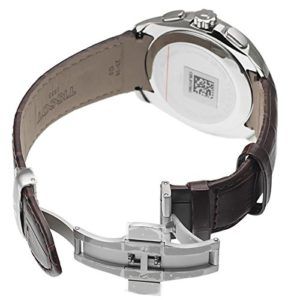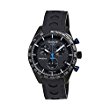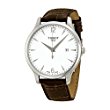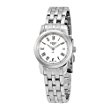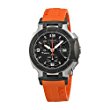Tissot Watches Review
There are two components to every watch, which must always be considered: quality and value. You don’t want to pay too much for a new timepiece, but you also don’t want to overspend on something that ends up being a piece of junk. If you’re looking to stretch your money further, every Tissot watches review gives you an opportunity to do so.
This Swiss watchmaker is also one of the few that used Tritium for illumination purposes in their watches. So not only do you receive the high-end quality of a Swiss-made watch, but you can also see what time it is in virtually any weather or light conditions.
HERE’S THE HISTORY BEHIND TISSOT WATCHES
Tissot has been manufacturing luxury watches since 1853. The original company was founded as a comptoird’etablissage, which means that an independent network of workers would create different parts of each timepiece at home. Then they would be assembled once brought together so the timepiece could be sold.
The initial Tissot timepieces were pendant, pocket, and complication watches, with a majority of them, created for US customers. By 1917, Tissot was also shipping their high-quality timepieces to Russia. In these early years, this manufacturer created the first mass-produced pocket watch and the first watch with two time zones.
The first anti-magnetic watch would be introduced by Tissot in 1929. They would also be the first manufacturer to create watches from IDEA plastic, Alpine granite, mother of pearl, and even wood.
In 1930, Tissot merged with Omega to create a number of highly collectible timepieces that are still sought after today.
Since 1983, Tissot has been part of The Swatch Group family, making them part of the group that is the largest watch producer and distributor in the world. Tissot is also the official timekeeper for many world championship events in major sports, meaning that the manufacturer is responsible for the actual timing of each event, game, or race.
HOW GOOD ARE TISSOT WATCHES?
The best watches that come from Tissot use the same movements that are found in high-end brands. You’ll also find the timepieces at the upper end of the pricing spectrum from this brand use sapphire crystal, making the watch extremely scratch-resistant under even heavy wear conditions. They are solid, nice and heavy, and will run for years with very little maintenance.
The fit and finish are superb on virtually all of the models that are offered. Some consumers do encounter some issues, especially when it comes to the magnetization of the watch under certain conditions. There are also a few complaints that can be found online about having the crown break on Tissot timepieces, especially on the lower-priced models.
In general terms, however, Tissot is widely considered to be an outstanding brand for timepieces, and they have a reputation that matches the quality of their watches. In the $300-$500 categories of watches, it is difficult to find a better overall deal between quality and price anywhere in the watch industry today.
HOW ARE TISSOT WATCHES MANUFACTURED?
All Tissot watches are Swiss-made. To qualify for this label, a manufacturer must use a Swiss movement, and the timepiece must have at least 50% of its added value originate in Switzerland. The timepiece must also be inspected and assembled in Switzerland.
For the entry-level Tissot watches that are on the market today, this makes it very affordable for consumers to purchase a genuine Swiss-made watch.
There are some concerns about having Tissot source parts from China or have manufacturing occur in the APAC region instead of in Switzerland. You can tell if it is a genuine Tissot watch if the bezel numbers and text space are centered, and some models have chrome attaching points in each hand. The hands will also have a regular shape and a perfect finish.
Many counterfeit Tissots also tend to have incorrect “BI” lettering engraved onto the watch with a polish that is poor. Watches that are assembled and inspected in Hong Kong or China are not genuine Tissot watches, even if they claim to be and come with a warranty certificate from the seller.
If shopping online for a Tissot watch, ask about these features to make sure you are getting a genuine timepiece instead of a cheap knockoff.
WHAT KIND OF WARRANTY COMES WITH A TISSOT WATCH?
Tissot watches are backed by a 24-month warranty from the date of purchase, with specific terms and conditions applied to each watch. To make a warranty claim, each customer must present a valid warranty certificate. To become valid, a Tissot dealer must stamp the warranty certificate, and it must be dated, and then fully and correctly completed.
If the watch stops operating because of manufacturing or craftsmanship defects during the warranty period, then Tissot will attempt to repair the defect for free. If the repairs will not restore the timepiece to its normal operating condition, then the Tissot brand guarantees through the warranty agreement that the watch will be replaced with an identical model or one that offers similar characteristics.
This warranty applies to consumers in the US and in most other countries of the world. Australia and New Zealand customers may have additional protections. For more information about the terms and conditions of a Tissot warranty, please visit this link: http://support.tissot.ch/warranties/139-en.pdf
WHAT ARE THE PRICES OF TISSOT WATCHES?
Tissot offers a combination of fashion watches and high-quality luxury watches. Many of their 300+ models offer multiple variations, but each timepiece has a standard price associated with it.
The most affordable Tissot watches right now belong to their Everytime Quartz collection. The multiple designs and variations begin at just $185.
At the other end of the pricing spectrum, Tissot also offers the PRS 516 Automatic Chronograph, which has a manufacturer’s MSRP of $2,750.
In total, Tissot offers 12 models for your consideration that are priced above $2,000. Two of these models are skeleton watches. Several of them feature 18K Rose Gold. Some have automatic movements, while others are based on quartz movements.
WHAT ARE THE PROS AND CONS OF OWNING A TISSOT WATCH?
Pros
- Tissot accepts several major payment methods. If you’re purchasing a timepiece directly from Tissot, they accept Visa, Mastercard, and American Express. They are also one of the few manufacturers that accept PayPal and Affirm. Independent authorized retailers may accept other forms of payment as well.
- Tissot offers a 30-day return guarantee. Tissot guarantees the quality of each timepiece. As long as a watch is unworn and undamaged, it can be returned for a full refund within 30 days of delivery. To qualify for the refund, it must pass a quality inspection.
- Each timepiece has a relatively long-life battery. Tissot watches will generally have a battery that lasts for 2-5 years, depending on wearing habits and the model of watch purchased. Most Tissot watches also include a power reserve indicator, which causes the second-hand to skip every four seconds to let you know it is time for a battery replacement.
- You have multiple feature options. Tissot makes quartz and automatics with great regularity. They’ve also made touch-crystal watches [T-Touch] and other innovative models over the decades for a great timepiece-buying experience.
Cons
- A warranty repair must happen before a warranty replacement. Tissot attempts to repair a timepiece within the warranty period before offering an outright replacement. This can be especially frustrating for some consumers who send in the watch for multiple repairs within a short amount of time.
- It can be difficult sometimes to find a reputable dealer. There is a number of counterfeit and “sub-standard” Tissot watches that are on the market today. This means you must purchase a Tissot watch from a reputable dealer to guarantee the quality of your investment. Local dealers that are reputable can sometimes be difficult to find. Amazon backs up online purchases, but the PRC200 from Tissot is one of the most counterfeited watches in the world – use caution when purchasing.
- Some watches have just stopped working. The most common complaint found about a Tissot watch is that they just stop working in 2-3 years, sometimes without the battery being an issue. This primarily occurs to the quartz watches, not their automatics, but it does cause some consumers to post reviews that say, “I’ll never buy another Tissot ever again in my life.”
ARE TISSOT WATCHES RIGHT FOR YOU?
Tissot has brought many watch collectors into our industry because they offer a good quality watch with an extensive company history, and you don’t have to pay an inflated price because of it.
That means you can choose a great model that fits your personal style, wear it whenever and however you wish, and come away feeling like the experience was generally positive.
There will always be some negative Tissot watches review postings here and there. For the most part, those who have purchased a Tissot timepiece have loved their watch, and if you make the investment, you’ll be able to discover why as well.
TISSOT WATCH FAQ
WHERE CAN I GET A USER GUIDE FOR MY TISSOT WATCH?
For a copy of the user guide for your watch, you can look online at the manufacturer’s website under the Warranty and User Manual section. Alternately, you can also contact an official Tissot Watch representative within your country for more information.
HOW DO I KNOW IF THE TISSOT WATCH I HAVE PURCHASED IS AUTHENTIC?
You can only purchase an authentic Tissot Watch through a certified distributor and authorized dealer. They are also each sold with an international warranty card that states the serial number of the watch, the reference of the watch, and the full name and address of the reseller.
WHAT IF THE LETTERS ‘WS’ ARE ENGRAVED ON THE BACK OF THE WATCH?
If you see the WS abbreviation on the back of your watch and it is followed by a code of 9 characters, it is a new generation serial number for the Tissot Watch. It allows the company to trace the watches from production to delivery in different countries.
IS MY TISSOT WATCH WATERPROOF OR WATER RESISTANT?
You will find that Tissot Watches have water resistance to a pressure of 3 bar, 5 bar, 10 bar, 20 bar, or 30 bar. The individual specs of this are indicated on the case back of the particular Tissot watch you own. However, you also do need to keep in mind that different environmental factors may also play a role in just how water resistant the watch is, and its water resistance is not a guarantee.
DO I WANT A SELF-WINDING OR A MANUAL-WINDING WATCH?
Watches can typically be wound in one of two ways. If you choose a manual-winding watch, it needs to be wound daily by hand with the crown. Self-winding watches, on the other hand, use an internal rotor to wind them, and this motor responds to movements of the wrist. So, it really is up to your own preference, and if you want to be responsible for manually winding the watch daily, so it operates continuously.
HOW OFTEN DOES MY TISSOT WATCH NEED TO BE SERVICED?
If you want your watch to remain highly operational, then like with other high-tech products, you will want to be sure to have it serviced regularly. The frequency of service will also depend on other factors, including environmental factors and the particular model you own. Service every four to five years under normal conditions is recommended to maintain advanced functionality.
IF I NEED SPARE PARTS, WHERE CAN I ORDER THEM?
The Tissot brand and company guarantees the availability of spare parts for men and women for approximately ten years from its date of production. If it is a gold watch, this timeframe goes up to 20 years.
Last update on 2020-09-25 / Images from Amazon Product Advertising API

